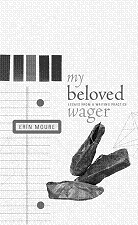
My Beloved Wager
Erin Mouré
NeWest Press
$24.95
paper
352pp
978-1-897126-45-5
This book, in its density, use of poststructuralist theory, and intellectual essais, is no less demanding and no more soothing than her poetry. What’s required to follow Mouré’s process is not a PhD, but a willingness to re-read paragraphs slowly, or backwards, or upside down. Theory, after all, like poetry and stories, deals with the basic elements of human and social life: the body, relationships people have with each other and with the world, and our negotiations with the structures that surround us and through which we move. Mouré communicates the aesthetics of marginalization, the impossibility and importance of translation, and the damage censorship causes to the soul and the body.
It’s not neuroscience.
Or it is – if like Mouré we consider that language proceeds from the actual atoms that form our brains. Poetry is, in Mouré’s view, a scientific process as much as a cultural one.
But the cultural element can’t be ignored. Mouré believes poetry is radical, in both senses of the word: revolutionary as well as “of the roots” since it deals with communication on the most basic level. And this book is radical, politically as well as poetically; though, as a work of poetic exploration, it makes more sense to refer to its driving force as “poetics” rather than “politics.” A radical poetics, then, articulated and explored through questions of citizenship, censorship, identity, borders, and body.
And as such, a poetics committed to the transformation of daily life. Mouré asserts that writing should be treated as a practice rather than a product – a verb rather than a noun. The book does not contain analyses of the meaning of poems, neither Mouré’s nor those of the other poets she features. Instead, readers are invited to think about what poetry does, as well as how and what it is. Readers are often trained to approach the reading of poetry as a kind of decoding of images, metaphors, and word choices, as though every work is simply a conversion of another clearer, less “poetic” idea. Mouré’s tactics against this approach are, at the very least, exhilarating.
The pieces in this book are varied in theme and tone, but they build on each other and carry ideas forward. We see the author in different frames: coping (wryly, humorously) with the corporate co-opting of poetry, discovering contemporary Toronto through the work of an early modernist Portuguese poet, and, while cooking a pan of quails, attempting to “[participate] with them in the fragility of another act related to song, that of eating.” Mouré remains remarkably present, as a writer, a woman, a feminist, a lesbian. (At one point, she describes her work, only somewhat tongue-in-cheek, as “hi-toned obscurantist lesbo smut.”) These essays insist upon a philosophy that is sunk in the real, while remaining ethically and practically bound to the realm of the possible.
Mouré’s “beloved wager” is on the possibilities offered by books: the opportunity at every page to be changed by language and have the world created anew. To read this book is to gamble on one writer’s belief in the importance of words.
It’s a pretty solid bet.
mRb





0 Comments